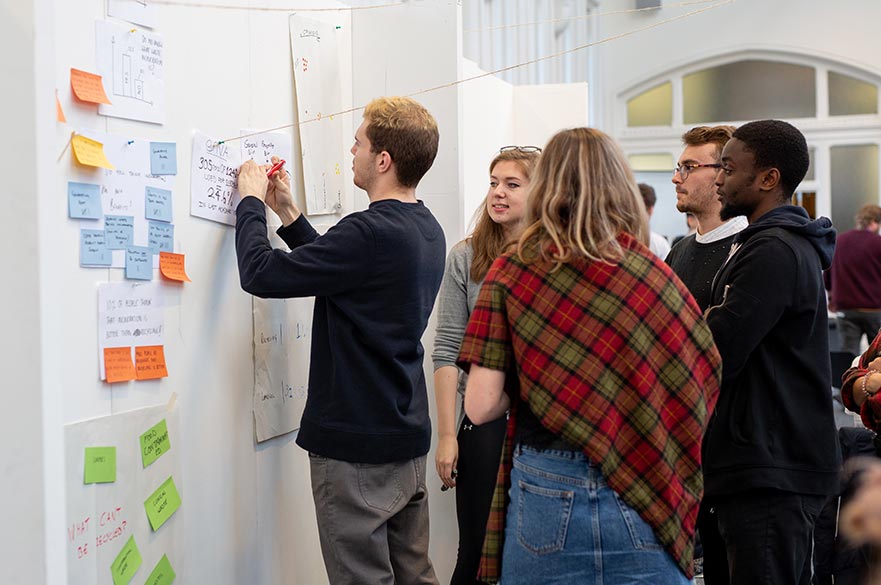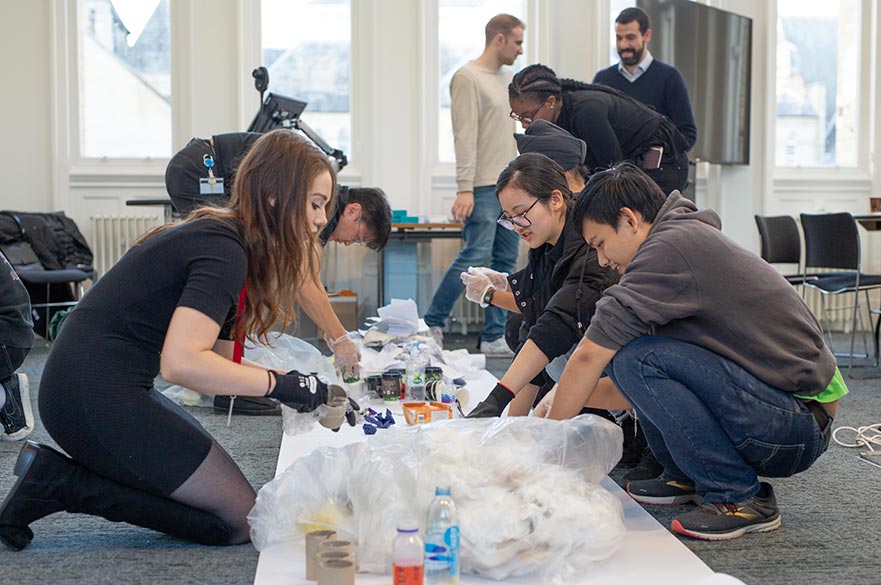Product Design final years tackle recycling issues across NTU in crowdsourcing workshop
BA (Hons) Product Design and BA (Hons) Furniture & Product Design students took part in a recycling workshop, exploring the effectiveness of recycling at NTU
By Chloe Subitte | Published on 26 November 2018
Categories: Current students; School of Architecture, Design and the Built Environment;

Students in their final year of our Product Design courses recently took part in one-day workshop entitled ‘Increasing Awareness to Recycling – a Case of the NTU Campus’, to investigate and understand the ways both staff and students recycle, and to gain their assumptions about recycling whilst on the university’s City Campus.
Comprising of almost 100 students, the workshop was created to conduct a significant body of research with one main topic, to get the most out of gaining primary research in a short amount of time, by using the power of ‘crowdsourcing’. This is a technique for coordinating a large group of people in an open-ended exploration of research, which allows everyone involved to participate and investigate the chosen topic.
The workshop was a collaboration between NTU and ENVA, a provider of public sector waste services to Nottingham City Council. The team were present to help support students in their preliminary investigations and deal with any challenges they faced. They also guided the practical elements of the workshop, by assisting the students in identifying what which items of packaging and general waste were and were not recyclable.
Robyn Thompson, a BSc (Hons) Ecology and Environmental Management alumni from NTU, who now works with the ENVA team, spoke to us about the benefits of larger research projects within the context of recycling. She told us: “This session has been really great! I’ve spoken to students here who have been enlightened about so many of the products they use and buy every day, which they thought were recyclable. It’s also nice to see that this is impacting not only their academic projects on the course they study, but also their personal use too.”

Students working with Robyn Thompson from Wastcycle Ltd
Students were asked to participate and oversee a number of research methods, to help answer key questions set by the Product Design Lecturers. These included: “What are the most common items that people wrongly recycle?” and “Do the current recycling bins work effectively? Why or why not?” Research methods of the workshop included photography, surveys, online polls, field observations and interviews.
Daniel Shin, Senior Lecturer in Product Design and the member of staff primarily responsible for setting up the workshop, emphasised how important this method of learning is, and told us about the ways in which crowdsourcing can be useful for academic research. He commented: “These sessions are beneficial to help our students visualise the outcome of their work, by using the different forms and methods of communication, which can help them to become much more engaged and involved in their learning. We want to change the dynamics of our students’ learning, and these workshops help to achieve that.”
From a more personal standpoint, the students were also inspired to change their own recycling habits from their research findings – to become more aware of what products and packaging were not recyclable. This included the findings that ‘meal deal’ lunch options (such as sandwich packaging and crisp packets), napkins and coffee cups were all non-recyclable, as well as other typically recyclable packaging such as cardboard takeaway pizza boxes due to the residual grease.
James, a BA (Hons) Furniture and Product Design final year told us more: “I’m wanting to focus my dissertation on the subject of recycling as a whole, so today has been so helpful for my research and idea creation. The main thing that stood out to me was how misleading some of the companies who make these products are, so much of what we use isn’t recyclable or can’t be recycled once used due to grease, food residue or mishandling – so it makes me want to think more about what and how I recycle in the future.”